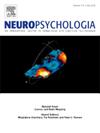Impaired neural discrimination of regular words from pseudowords in dyslexic adults as revealed by fast periodic visual stimulation
IF 2
3区 心理学
Q3 BEHAVIORAL SCIENCES
引用次数: 0
Abstract
We used Fast Periodic Visual Stimulation with EEG recordings to assess the sensitivity of adults with dyslexia to fine-grained psycholinguistic variations of letter strings: lexicality and orthographic regularity. Dyslexic and non-dyslexic university students watched 60-s streams of stimuli presented at 10 Hz with deviant items (words) inserted periodically (1/8, at 1.25 Hz). While there was no overall difference in neural response between groups at the base stimulation frequency (10 Hz), individuals with dyslexia showed significantly reduced 1.25 Hz discrimination response for regular and irregular words among pseudowords (lexicality) over the left occipito-temporal cortex. Interestingly, while dyslexic individuals had significant weaker responses for irregular words than normal readers, they did not show any discrimination response for regular words within streams of pseudowords. However, they displayed responses to regularity changes within streams of words, that were not significantly below typical readers’. Overall, these observations suggest that lexical processes are not automatically triggered in dyslexia when a decoding strategy is enhanced by context (i.e., pseudowords) but may be at work when the overall activation of the lexicon is high (i.e., words). The results also show the diagnostic value of the FPVS-EEG approach to determine and characterize reading impairments rapidly, objectively and implicitly.
快速周期性视觉刺激对成人阅读障碍正常词和假词的神经辨别能力的影响。
我们使用快速周期性视觉刺激和脑电图记录来评估患有阅读障碍的成人对字母串的细粒度心理语言学变化的敏感性:词汇性和正字法规律性。有诵读困难的大学生和没有诵读困难的大学生观看60秒的刺激流,这些刺激流以10赫兹的频率呈现,周期性地插入不正常的项目(单词)(1/8,1.25赫兹)。在基础刺激频率(10 Hz)下,不同组间的神经反应无显著差异,但阅读障碍个体左侧枕颞叶皮层对假词(词性)中规则词和不规则词的识别反应(1.25 Hz)显著降低。有趣的是,虽然阅读困难的人对不规则单词的反应明显弱于正常读者,但他们对假词流中的规则单词没有表现出任何区分反应。然而,他们对单词流中规律性变化的反应并不明显低于典型读者。总的来说,这些观察结果表明,在阅读障碍中,当解码策略被上下文(即假词)增强时,词汇过程不会自动触发,但当词汇的整体激活程度很高(即单词)时,词汇过程可能会起作用。结果还表明,该方法在快速、客观、隐式地判断和表征阅读障碍方面具有一定的诊断价值。
本文章由计算机程序翻译,如有差异,请以英文原文为准。
求助全文
约1分钟内获得全文
求助全文
来源期刊

Neuropsychologia
医学-行为科学
CiteScore
5.10
自引率
3.80%
发文量
228
审稿时长
4 months
期刊介绍:
Neuropsychologia is an international interdisciplinary journal devoted to experimental and theoretical contributions that advance understanding of human cognition and behavior from a neuroscience perspective. The journal will consider for publication studies that link brain function with cognitive processes, including attention and awareness, action and motor control, executive functions and cognitive control, memory, language, and emotion and social cognition.
 求助内容:
求助内容: 应助结果提醒方式:
应助结果提醒方式:


